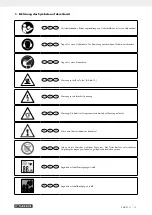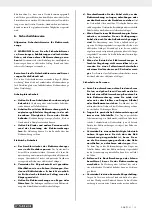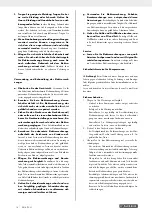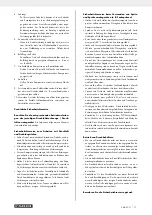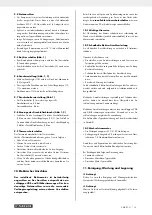
5
GB/IE
c. Disconnect the plug from the power source
and/or remove the battery pack, if detachable,
from the power tool before making any adjust-
ments, changing accessories, or storing power
tools.
Such preventive safety measures reduce the risk of
starting the power tool accidentally.
d. Store idle power tools out of the reach of chil-
dren and
do not allow persons unfamiliar with the power
tool or these instructions to operate the power tool. Power
tools are dangerous in the hands of untrained users. Un-
used power tools should be stored in a dry, elevated or
closed location out of the reach of children.
e. Maintain power tools and accessories.
Check for
misalignment or binding of moving parts, breakage of parts
and any other condition that may affect the power tool’s
operation. If damaged, have the power tool repaired be-
fore use. Many accidents are caused by poorly maintained
power tools.
f. Keep cutting tools sharp and clean. Properly
maintained cutting tools with sharp cutting
edges are less likely to bind and are easier to
control.
g. Use the power tool, accessories and tool bits
etc. in accordance with these instructions,
taking
into account the working conditions and the work to be
performed. Use of the power tool for operations different
from those intended could result in a hazardous situation.
h. Keep handles and grasping surfaces dry, clean
and free from oil and grease.
Slippery handles and
grasping surfaces do not allow for safe handling and con-
trol of the tool in unexpected situations.
Service
a. Have your power tool serviced by a qualified
repair person using only identical replacement
parts.
This will ensure that the safety of the power tool is
maintained.
Compressor safety warnings
m
Attention!
The following basic safety measures must be
observed when using this compressor for protection against
electric shock, and the risk of injury and fire.
Read and observe the entire operating manual before using
the device.
Safe work
1. Take care of your tools
- Keep your compressor clean in order to work well and
safely.
- Follow the maintenance instructions.
- Check the connection cable of the power tool regularly
and have it replaced by a recognised specialist when
damaged.
- Check extension cables regularly and replace them
when damaged.
2. Pull the connector out of the socket
- When the power tool is not in use or prior to mainte-
nance and when replacing tools such as saw blades,
bits, milling heads.
3. Check the power tool for potential damage
- Protective devices or other parts with minor damage
must be carefully inspected to ensure that they function
correctly and as intended prior to continued use of the
power tool.
- Check whether the moving parts function faultlessly and
do not jam or whether parts are damaged. All parts
must be correctly mounted and all conditions must be
fulfilled to ensure fault-free operation of the power tool.
- Damaged protective devices and parts must be properly
repaired or replaced by a recognised workshop, insofar
as nothing different is specified in the operating manual.
- Do not use any faulty or damaged connection cables.
4. Attention!
- For your own safety, only use accessories and additional
equipment that are indicated in the operating manual or
have been recommended or indicated by the manufac-
turer. Use of other tools or accessories that those rec-
ommended in the operating manual or in the catalogue
could represent a personal danger to you.
5. Replacing the connection line
- If the connection line is damaged, it must be replaced
by the manufacturer or an electrician to avoid danger.
There is a risk of electric shock.
6. Inflating tyres
- Directly after inflating tyres, check the pressure with a
suitable pressure gauge, for example at your filling sta-
tion.
7. Street-legal compressors in construction site operation
- Ensure that all hoses and fixtures are suitable for the
maximum permissible working pressure of the compres-
sor.
8. Set-up location
- Only set up the compressor on a flat surface.
9. In case of pressures above 7 bar, it is recommended to
equip supply hoses with a safety cable (e. g. a wire rope).
10. Avoid over-stressing the piping system by using flexible
hose connections to prevent kinking.
Additional safety warnings
Observe the corresponding operating manuals of
the respective compressed air tools / compressed
air attachments!
The following general warnings must also
be observed.
Safety warnings for working with compressed air
and blasting guns
• Ensure there is sufficient distance to the product, at least
2.50 m, and keep the compressed air tools / compressed
air attachments away from the compressor during operation.
• The compressor pump and lines can become very hot during
operation. Touching these parts will burn you.
• The air which is sucked in by the compressor must be kept
free of impurities that could cause fires or explosions in the
compressor pump.
• When releasing the hose coupling, hold the hose coupling
piece with your hand. This way, you can protect yourself
against injury from the rebounding hose.
Summary of Contents for PSKO 24 B2
Page 3: ...2 15 10 13 6 12 11 5 16 4 7a 7 14 3 5 5b 5a 1 1 7 6 5 8 2 3 4 14b 14a 14 13 12 9 10 11...
Page 4: ...6 4d 4 8 4a 4c 4d 7 9 9c 9a 9b 8 9 4a 4b 4c 4d 10 A...
Page 105: ......
Page 106: ......
Page 107: ......

















